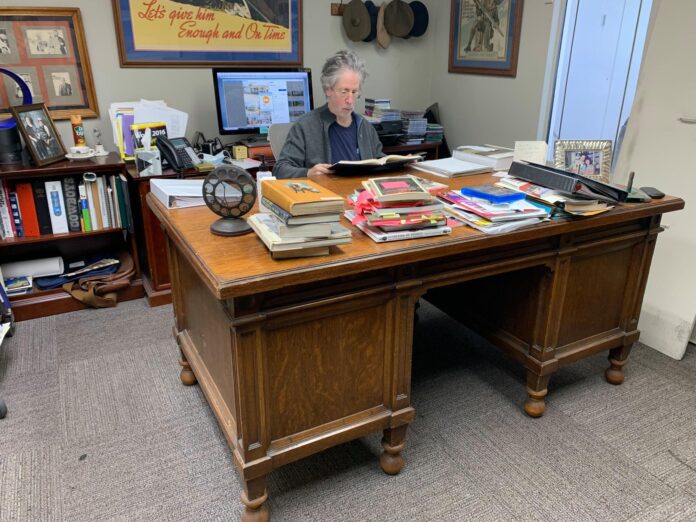The ongoing Writers Guild of America strike by Hollywood scribes is affecting more than writers and studios.
Below-the-line businesses are being impacted as well.
Take Lennie Marvin’s Prop Heaven in Burbank, for example.
Chief Executive Keith Marvin said the prop house has seen a downturn in business, although things have been trending that way for a while.
“It is down, but it is just a continuation from the second half of last year and it escalated a bit more this year, so it’s down another tick after that,” Marvin said. “But it was already down. It is not like May 1 hit and then everything stopped. It is not like that, like how Covid came in and we shut down. It is just a continual reduction in production.”
Pam Elyea, vice president of History for Hire, a North Hollywood-based prop house she runs with her husband, Jim Elyea, said that her business is down about 40% due to the strike. She has also had to lay off 20% of her workforce, or four employees.
The first quarter is when she really began to see a slowdown in film and television production, Pam Elyea said.
Typically what happens during that period is one will see scripts and the opening of accounts to know that new business is coming in, she added.
“We haven’t had that since the first of the year,” Elyea said. “We’ve had a few people opening accounts, but it’s nowhere near the way it was.”
The writers went out on strike this month after their contract with the Alliance of Motion Picture and Television Producers expired. The main sticking points in negotiations between the two sides are compensation from streaming services, how many writers should be allowed to write for television shows and for how long they should be able to write for episodic television.
“The companies’ behavior has created a gig economy inside a union workforce, and their immovable stance in this negotiation has betrayed a commitment to further devaluing the profession of writing,” the WGA said in a statement released on May 1.
“From their refusal to guarantee any level of weekly employment in episodic television, to the creation of a ‘day rate’ in comedy variety, to their stonewalling on free work for screenwriters and on AI for all writers, they have closed the door on their labor force and opened the door to writing as an entirely freelance profession,” the WGA added.
In a statement sent to NPR sent shortly before the announcement of the strike call, the Alliance said it had presented a package proposal to the guild “which included generous increases in compensation for writers as well as improvements in streaming residuals.”
According to that statement, the studio’s alliance told the WGA it was prepared to improve that offer “but was unwilling to do so because of the magnitude of other proposals still on the table that the Guild continues to insist upon. The primary sticking points are “mandatory staffing” and “duration of employment — Guild proposals that would require a company to staff a show with a certain number of writers for a specified period of time, whether needed or not.”
Unlike Pam Elyea, Marvin has not had to lay off any of his employees.
“We were running lean and mean, so we are a little busy scrambling when it is busy, but we were able to retain everybody,” Marvin said.
He said a strike is “nothing new.”
After all, he remembers 1981, when the writers went on strike over payment from cable and videotapes, then the latest in technology in the entertainment industry. The current strike is also about new technology, he added.
“They sorted that out and they will eventually sort this out,” Marvin said. “I don’t know how. Smarter people will figure that out. In the meantime we are just making do.”
